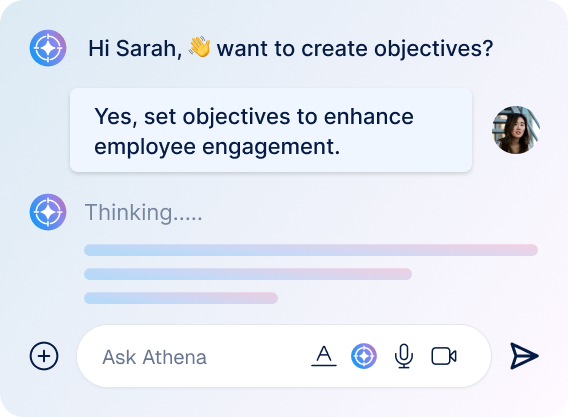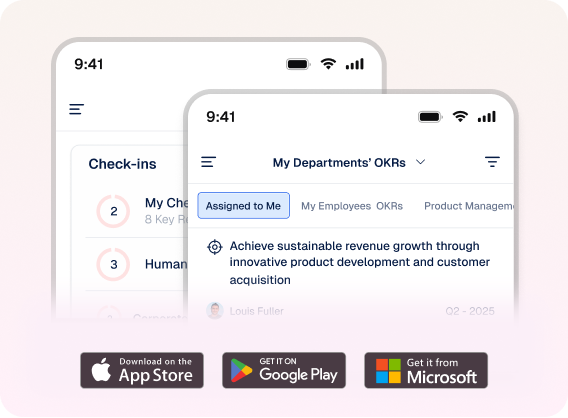TL;DR
The halo effect is a cognitive bias where one strong positive (or negative) trait shapes how we judge a person overall. In the workplace, this can unfairly influence promotions, feedback, and opportunities. Clear expectations, structured evaluations, and transparent goal systems like OKRs help managers focus on measurable outcomes instead of impressions, reducing stress and improving engagementWhy do customers return to the same brand over and over? Why do managers select one employee above the others to handle important projects? Why does one positive experience inform a nearly unshakeable opinion?
This phenomenon is explained in behavioral economics— it’s called the halo effect. Generally, the halo effect refers to a specific aspect of someone’s personality to constitute our overall judgment of that person. This positive aspect of a person’s behavior eclipses their other attributes and leads us to view them as an overall positive person and find their other behaviors acceptable, even if they’re not. This phenomenon holds considerable importance when it comes to managing the performance of employees in the workplace. It can be very dangerous to assume that someone’s character is entirely positive or negative based on initial impressions. Employers must be particularly careful not to label employees based on a single mistake or to hold them to impossible standards because of their exceptional performance in the past. No one should have to feel as though a single mistake has drastically affected their boss’s opinion of them; when people feel that their reputation has worsened, their job performance is likely to get worse as well. That isn’t to say that people shouldn’t be accountable for their actions– they should. But it also means that employers need to recognize that support and positive reinforcement can go a long way.The Halo Effect in the Workplace
Managers must be familiarized with this concept so that they can use it to maintain employee engagement effectively. An employee must never be made to feel a single mistake has led to them being labeled. Humans are susceptible to errors, and it should not constitute the very basis of who they are. If they feel that a single slipup has lessened their importance in the workplace, their subsequent performance will likely deteriorate, along with their motivation and eagerness to participate effectively at work. This doesn’t necessarily imply that employees should not be disciplined for their mistakes. They can be reprimanded if necessary but must be given a chance to start anew and prove their worth utilizing positive reinforcement.Always deliver more than expected.
Putting it into Perspective
Let’s say you are someone who is typically labeled as an “overachiever” at your company. People see you as though there’s a halo around your head; you can do nothing wrong. Because you’ve proven yourself to be so capable and hard working in the past, your boss and coworkers have really high expectations for you. However, with high expectations also come high stress levels. You consistently work hard to maintain your reputation, but sometimes the pressure feels like it’s too much to handle. For some, making a mistake could seem like the end of the world. If you don’t get that project done in time or if your team hasn’t finished their testing, that could make a mark on your reputation. If you don’t feel appreciated or valued because you’ve gained a poor reputation, you’re probably not going to want to put in the work to fix it. In such a ruthless environment, employee engagement is sure to suffer.OKRs and the Halo Effect
When a company sets expectations for all of its employees, it helps to manage some of the unnecessary stress that comes along with having a workplace reputation. Giving employees specific goals and expectations lets them know how much work is expected of them and, in doing so, ensures that they’re not being overworked or getting discouraged by a miscommunication of goals. Everyone knows what they need to do to stay on track. This system is also valuable for managers as well. Having OKRs pertaining to expectations and goals is an excellent way to manage reputation-induced stress that can affect so many people within a company. Stress can often lead to burnout, which managers and their teams alike hope to avoid. As a technique, setting expectations and timelines for employees will not only help those individuals, but their bosses as well. Everyone is more likely to achieve when they know what they should be doing and how they can get there.Ready to start your OKR Journey for FREE?
The halo effect happens when a single quality—such as charisma, punctuality, or one big win—colors how managers or coworkers view everything else about a person.
It can lead to biased performance reviews, favoritism, missed development needs, and unrealistic expectations for high performers
Yes. Sometimes called the “horn effect,” one mistake can overshadow many strengths and unfairly damage someone’s reputation.
When people feel labeled—positively or negatively—they may experience pressure, stress, or demotivation. Over time, this can reduce productivity and morale
Use structured reviews, gather input from multiple sources, document performance regularly, and evaluate against clear, pre-defined goals rather than memory or impressions.
Related Articles
-
How to Spot Hidden Biases That Affect Portfolio Decisions
TL;DR Cognitive biases can quietly undermine project portfolio decisions, leading organizations to pick the wrong projects and waste resources. Common... Read more
-
Why Do People Break Promises? The Psychology Behind the Say-Do Ratio
Organizations and individuals rarely fail because of poor intentions; they fail in the space between commitment and execution. The say-do... Read more
-
Why Leading by Example is the Most Powerful Leadership Tool
Here’s a little secret about leadership and not the kind you read in thick business books or hear about in... Read more
-
Understanding Impostor Syndrome: The What, Why, and How to Beat It
Ever feel like you’re just pretending to be good at your job and any minute now, someone’s going to find... Read more




